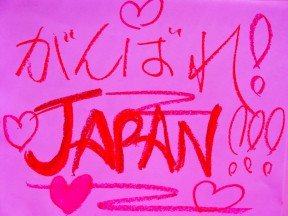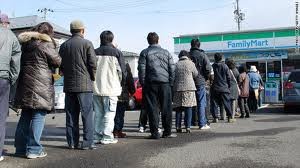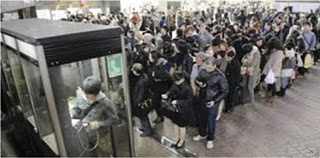
Even five days after the Tsunami in Japan, I still cannot stop crying. The victims in North are very simple and good people, and most of them are farmers and fishermen. I am deeply moved by those humble people who have been so appreciative for what they have left right now. No one is complaining. It is just too amazing to me. I love my country, and I am so proud to be Japanese.
And, I’d like to thank you for your phone calls and emails from all over the world expressing your concern and love for me and Japan. I am overwhelmed by your support and kindness. Japan needs help right now, and probably for a while. However, the Japanese are strong people, and they will certainly rebuild the nation. My heart is still deeply broken, but I must take action to help my country. What we can do is to donate blood, money, clothing, blankets… there are many things we can do. Please find out your local organizations that are helping Japan. Also, please pray. Please pray for the dead and for those who are suffering right now. Your prayer is needed. Thank you so much for your kind support.
While the continuous disasters have been occurring in Japan, I have been receiving so many questions and comments about the Japanese behavior during the crisis. The foreign media has been talking about how “orderly” and “calm” we are. The Japanese line up politely anywhere – at shops, telephone booths, stations, etc. To me it is so normal because I am Japanese. That is just how we are. Many non-Japanese friends of mine have told me, “Oh my god. If that happened in my country, people would steal, fight, and everything. There would be looting everywhere, and it would be a total chaos.”
“Why are Japanese so calm and polite during such a difficult time?” It is our aesthetics. It is our characteristic, and it is our culture. So, where does it come from? It seems that our aesthetics comes from “Bushido” (the way of the Samurai warrior) and Buddhism.

Bushido emphasizes justice, loyalty, honor, bravery, obedience, duty, respect and self-sacrifice. Buddhism taught us compassion and love for others. Also, there is a sense of “avoiding shame”: you would not want to do anything that could bring shame to your name, face and your family. These elements are deeply rooted in our culture. Therefore, during such a disastrous time people behave politely and compassionately to each other.

I want to say to everyone in Japan, especially to those who are in North, please hang in there! I cannot find the right words to express the pain in my heart, but all I can say is that I am praying for you very hard. May you all be safe, and your pain be eased as soon as possible.
Rima Fujita is a full-time artist living in San Diego, California. She was born in Tokyo, and has lived in New York for over 32 years. More about her on http://rimafujita.blogspot.com/









I typed three different comments and deleted them…nothing seems like a befitting response. Prayers and more prayers…God speed!
Japan, may God give you strength to face this!
The dignity and grace with which Japan is weathering this worst natural calamity of our times is truly awesome. Feel completely humbled and lost in admiration for the aesthetics of this truly great nation. All our prayers for them …
Hi Rima,
Our magazine is always interested in featuring the stories of real women. With regard to what is happening in Japan, I came across your blog entry and am interested to hear back from you, if sharing your feelings and opinions with the magazine is something that you feel comfortable with.
Please feel free to e-mail me if so! And I very much look forward to hearing from you.
Thank you all for your kind support. Please keep Japan in your prayer. My country really needs it right now. Thank you, my friends.